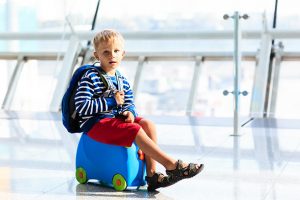Confession: I traveled with my kids as infrequently as possible until my youngest was nearly two years old The experts say you should start children on travel early, but I'm not sold on traveling with babies just for the sake of traveling with babies. It's expensive and it's frustrating for both parent and child. And to me, it has always felt less like a vacation and more like parenting in a place where you have fewer resources and higher expectations—a recipe for disappointment.
That said, I'm a firm believer in raising kids to be great travelers. And I think nearly all kids—homebodies and explorers alike—have the capacity to travel well as children and grow up to be independent, capable travelers. Here's how to get them there.
Get a Globe and an Atlas Early
How will kids want to see the world if they don't know what there is to explore? A globe can be a fun tool for imaginary travel—just spin it and see where you land. And paired with a kid-friendly atlas (National Geographic Kids World Atlas is a good place to start), you can spend time together learning about countries, cultures, and just how much there is to see in the world.
Tell Stories of Your Own Travel
Children love stories, and they're especially captivated when someone they know has a starring role in one. Knowing you've got an eager audience, start weaving tales of your travels into your storytelling repertoire. And show them photos of your adventures (but don't trap them in a room for a three-hour slideshow; that could have the opposite effect you're going for).
RELATED: 8 Crafty Ways to Display Travel Keepsakes
Surround Yourself with Traveling Friends
Normalizing travel early can make a huge difference in a young traveler's life. Growing up, my parents didn't travel a lot, but I had world-traveling relations who would come for dinner and regale us with their travel tales. I loved these stories so much I would sneak to the kitchen door after bedtime to hear more of them. These people inspired my love of travel even before I was old enough to carry a suitcase, and gave me the confidence to go on every international student exchange I could find until I was old enough to travel on my own.
Teach Them to Roll with Things
As I'm learning with my own children, a lot about how kids approach the world is embedded in their personalities early on. But skills like adaptability and resilience can be taught, and are key characteristics of happy travelers. When things go wrong at home, help kids learn to take a few breaths (I'm a big fan of smell the flowers/blow out the birthday candles to teach deeper breathing) and then problem solve. For travelers, this kind of level-headedness is very nearly a superpower, so if you can teach them early, they'll have what it takes to deal with unexpected flight delays, overbooked hotel rooms, and other travel challenges.
RELATED: 27 Places That Will Restore Your Faith in Travel
Foster Their Curiosity
The best travelers are curious people. In your everyday life, explore ideas with them and you'll create the foundation they need to explore the world now and later. This technique has a great side effect, as well: In nurturing your kids' curiosity, you just might rediscover your own. How exactly does an airplane take off? Why are volcanoes different shapes? What does the color blue taste like?
Help them Learn to Trust Their Gut
Helping kids connect to their instincts will help them grow into great travelers. Trusting your gut and learning to read the world go hand in hand. Both require processing a huge number of minute cues into a feeling that fuels action. Listening to your gut can help you avoid dangerous situations (as a college kid traveling in Athens in the 90s, I noticed a shift in the feeling on a street just in time to duck down a side street before an angry protest appeared on the horizon) and lead you exciting discoveries and beautiful surprises.
RELATED: The 10 Most Important Safety Tips for Travelers
Use the Rule of Seven
Because of all the big developmental stuff going on in their brains, kids often aren't the most reliable judges of their likes and dislikes on the first try. Some people say that kids need to try a new food at least seven (and up to 15) times before they know for sure whether or not they like it. Use this rule of seven to gently help kids learn to try new things multiple times—and to not immediately discount something if they're not onboard with it the first time around—will help them embrace the unfamiliarity of travel.
Travel with Them
Whenever you feel ready—weeks after birth, once your children can walk and talk, or when they're old enough to remember vacations—take your kids on trips. Weekend jaunts, road trips, epic international vacations … there's no single right way to do it.
Just get them out of the house and let them see the world from new angles. Don't expect it to go perfectly every time, and know that some kids take a day or two (or three) to warm up to traveling. The first night we're anywhere, my son always asks to go home, but by the second night he's usually declaring, "I want to stay here forever."
More from SmarterTravel:
- Here's What You're Doing Wrong on Your Family Vacation
- Tips for Traveling with Kids
- 10 Best Outdoor Towns in America
Read the original story: The Travel Skills Every Child Needs by Christine Sarkis, who is a regular contributor to SmarterTravel.
(Photo: Thinkstock/Shutterstock.)






